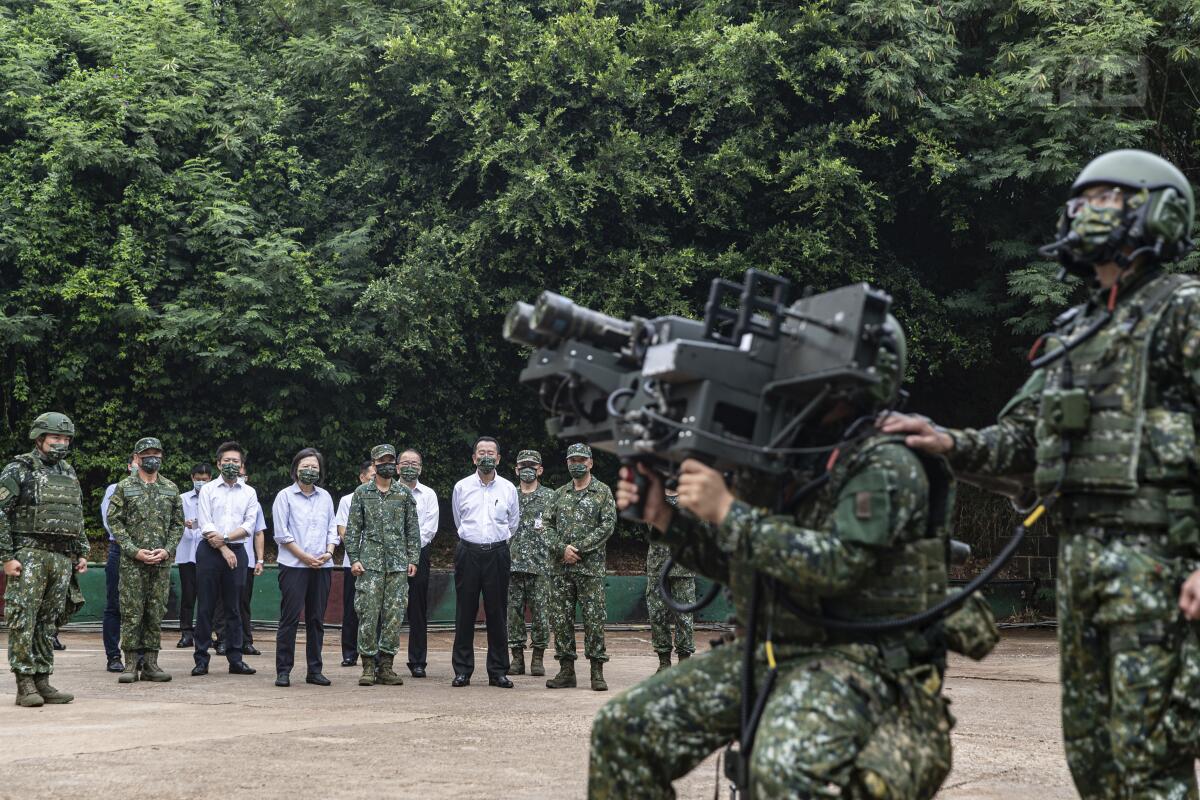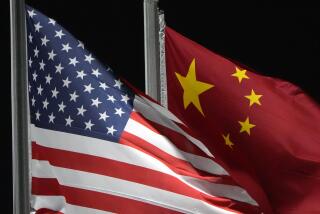Taiwanâs forces fire at drones from China flying over island outposts

TAIPEI, Taiwan â Taiwanâs military fired warning shots at drones from China flying over its outposts just off the Chinese coastline, underscoring heightened tensions and the self-ruled islandâs resolve to respond to new provocations.
Taiwanâs forces said in a statement that troops took the action Tuesday after drones were found hovering over the Kinmen island group.
The statement Wednesday referred to the unmanned aerial vehicles as being of âcivilian use,â but gave no other details. It said the drones returned to the nearby Chinese city of Xiamen after the shots were fired. Taiwan previously fired only flares as warnings.
The incident comes after China fired missiles into the sea and sent planes and ships across the dividing line in the Taiwan Strait earlier this month. It followed angry rhetoric from Beijing over a trip to Taiwan by House Speaker Nancy Pelosi, the highest-ranking elected U.S. official to visit the island in 25 years.
China claims Taiwan as its own territory, and its recent actions have been viewed as a rehearsal of a possible blockade or invasion. Chinaâs drills brought strong condemnation from Taiwanâs chief ally, the U.S., along with fellow regional democracies such as Australia and Japan. Some of Chinaâs missiles early in August fell into nearby Japanâs exclusive economic zone.
Taiwan maintains control over a range of islands in the Kinmen and Matsu groups in the Taiwan Strait, a relic of the effort by Chiang Kai-shekâs Nationalists to maintain a foothold on the mainland after being driven out by Mao Zedongâs Communists amid civil war in 1949.
Chinese military exercises in the waters around Taiwan have raised tensions between the two sides to their highest level in years.
Taiwanâs Defense Ministry said Chinaâs actions had failed to intimidate the islandâs 23 million people and instead had only hardened support for the Taiwanese armed forces and the status quo of de facto independence.
Officials said anti-drone defenses were being strengthened, part of a 12.9% increase in the Defense Ministryâs annual budget next year. The government is planning to spend an additional $1.6 billion, for a total of $13.8 billion for the year.
The U.S. is also reportedly preparing to approve a $1.1-billion defense package for Taiwan that would include anti-ship and air-to-air missiles to be used to repel a Chinese invasion.
Following the Chinese drills, the U.S. sailed two warships through the Taiwan Strait, which China has sought to designate as its sovereign waters. Foreign delegations from the U.S., Japan and European nations have continued to arrive to lend Taipei diplomatic and economic support.
Chinaâs furious response could drive more Taiwanese toward independence and push neighboring Asian nations to strengthen their defense strategies.
Arizona Gov. Doug Ducey is currently visiting Taiwan to discuss production of semiconductors, the critical chips that are used in everyday electronics and have become a battleground in the technology competition between the U.S. and China.
Ducey is seeking to woo suppliers for the new $12-billion Taiwan Semiconductor Manufacturing Corp. plant being built in his state.
Last week, Indianaâs governor visited Taiwan on a similar mission.
Taiwan produces more than half the global supply of high-end processor chips. Chinaâs firing of missiles during its exercises disrupted shipping and air traffic, and highlighted the possibility that chip exports might be interrupted.
Breaking News
Get breaking news, investigations, analysis and more signature journalism from the Los Angeles Times in your inbox.
You may occasionally receive promotional content from the Los Angeles Times.
Reacting to Duceyâs visit, China on Wednesday reaffirmed its opposition to any official contacts between the U.S. and Taiwan.
âWe urge the relevant parties in the U.S. to ... stop any forms of official contacts with Taiwan, and refrain from sending wrong signals to the Taiwan independence forces,â Foreign Ministry spokesperson Zhao Lijian said at a daily briefing.
âChina will take strong measures to resolutely safeguard national sovereignty and territorial integrity,â Zhao said.
More to Read
Sign up for Essential California
The most important California stories and recommendations in your inbox every morning.
You may occasionally receive promotional content from the Los Angeles Times.












